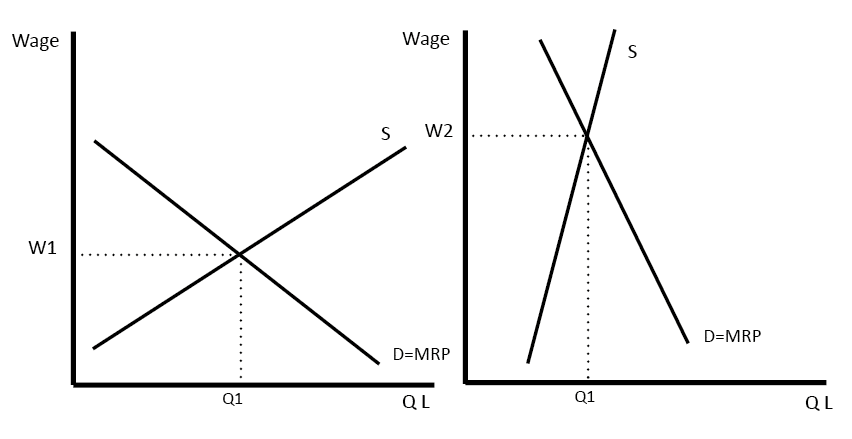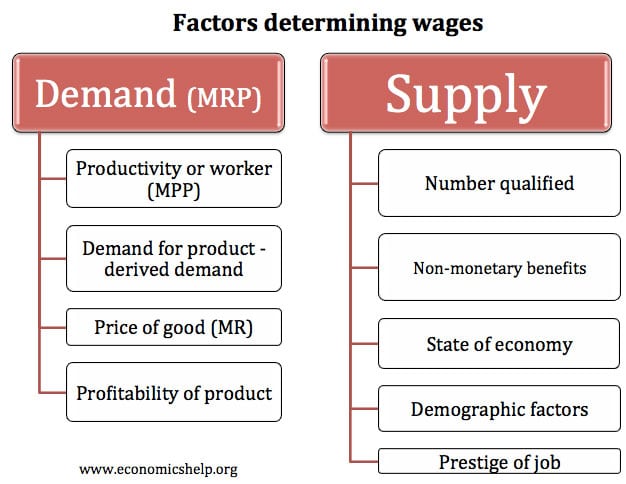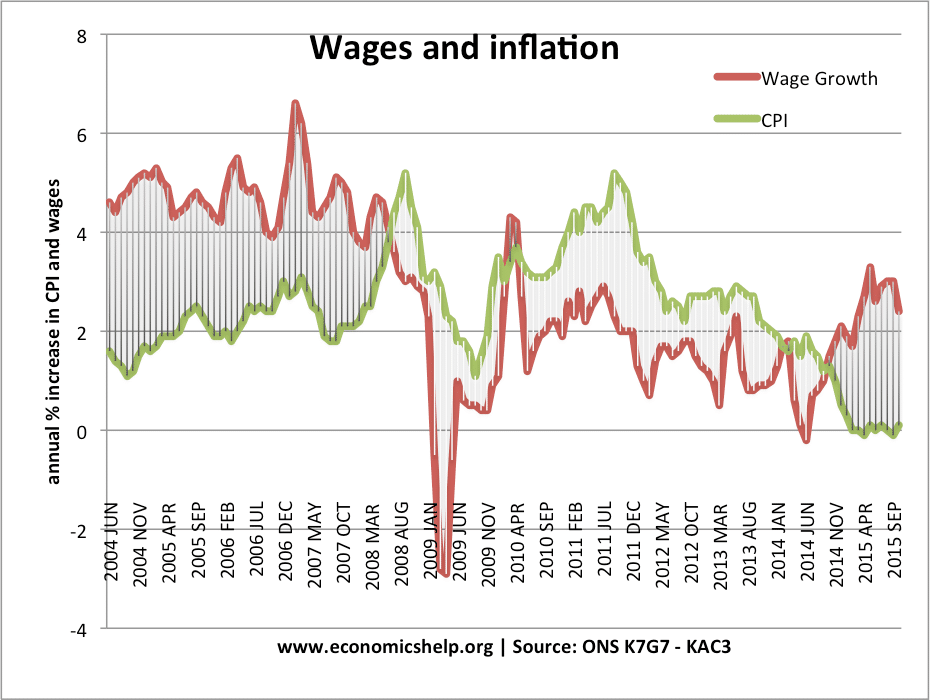Readers Question: What factors determine the wage that someone receives?
Basic economic theory suggests that wages depend on a worker’s marginal revenue product MRP. (this is basically the value that they add to the firm which employs them.)
MRP is determined by two factors:
- MPP – Marginal physical product – the productivity of a worker.
- MR – Marginal revenue of last good sold – Effectively the price and demand for the good that the worker produces.
- More on Marginal Revenue Product and determination of wages
If we take wages for strawberry pickers.The worker who picks much faster and fills his basket of strawberries should get paid a higher salary than a lazy worker who falls asleep. For jobs such as strawberry picking, firms can pay piecemeal and link pay to productivity.
Diagram of wage determination for two different types of workers
- On the left, demand and supply are both elastic. This could be a cleaner – a job with relatively low skill requirements, meaning many people can do the job.
- On the right, demand and supply are more inelastic, leading to higher pay. This could be a job like an accountant. Relatively high skills required and an accountant makes a more significant difference to a firm’s profitability.
Another factor that determines pay is the demand for the good. For example, the best football players get paid much more than the best hockey players because there is much more demand for watching football games, there is more money in the sport, so clubs are willing and able to pay much higher salaries to get the service of the best players.
Supply-side factors
As well as demand, pay will be determined by supply.
Skills/Qualifications. Workers who have specialist skills will generally be awarded higher pay. This is because, for jobs with specific qualifications, supply is more restricted – more inelastic. This shortage of supply pushes up wages. For a job like a burger-flipper, most people are qualified, so supply is more elastic.
Non-monetary benefits. If a job is considered desirable for non-monetary benefits, the supply may be relatively greater compared to other jobs. This enables firms/government to pay relatively lower wages for equivalent skills. For example, many public sector jobs – nursing, teaching have wages lower than equivalent private sector jobs.
Demographic factors. If there is an ageing population, there could be a shortage of young, skilled workers. In theory, this would push up wages. Fre movement of labour and the net migration of unskilled workers could lead to lower pay for jobs, such as fruit picking.
Limitations of this theory
- It is difficult to measure productivity. As a teacher should my pay depend on the results of my students? – For a job like a judge, teacher, nurse, there is no easy way to measure productivity. It becomes a normative judgement.
- It assumes competitive markets. But, in practice many labour markets are imperfect. Either firms have monopsony power or workers form trades unions. Firms with monopsony power are often able to ignore MRP in setting wages and pay relatively lower wages. Workers in strongly unionised industries may be able to claim higher pay.
- The question of who ‘deserves’ higher pay is different to who can command a higher wage. A footballer may be able to earn £50,000 a week because he can earn his club a lot of money. But, does that mean he necessarily deserves £50,000. Perhaps he doesn’t ‘deserve’ so much. But, it becomes a very normative judgement to decide who deserves what. Many may say a nurse ‘deserves’ as much as a pop star. But economic forces are unlikely to lead to equal pay.
- Pay will also vary depending on cultural differences. The best hockey players in Pakistan will be rewarded with high pay because it is one of the national sports. But, in England, hockey is a minor sport, so pay is relatively lower.
Wages determined by Labour Market imperfections
In the real world, wages will also be determined by other factors
- Monopsony employers. Monopsonies can pay lower wages to workers because they have market power in setting wages.
- Discrimination. Some employers may get lower pay or find it harder to get jobs because they are discriminated against.
- Trade unions. Workers in unions may be able to get higher pay because the union can put pressure on the employer to increase wages
Historical trends in wages
This diagram shows trends in real wages since 2004. Up until the economic crisis of 2009, real wages were growing at a post-war trend of 2-3% a year. Since 2009, we have seen a fall in real wages. This is due to several factors
- Increased monopsony power of firms/decline in trade unions
- Increased labour market flexibility, which gives firms more power to keep wages low
- Growth in low-paid temporary/part-time jobs.
- Poor productivity growth. Firms cannot afford higher wages due to decline in productivity growth.
See also




The average wage in our Country is low compared to the ever increasing Cost of Living. As a single parent I made what would be considered “a good wage”, $11.55/hour yet I was struggling, I was living pay check to paycheck and just barely making enough to keep my head above water, I made enough to pay my rent, utilities, car payment, car insurance and gas, which left me virtually broke ($50) until payday, this is barely enough for essentials such as food, let alone things like laundry soap, shampoo, deoderant, garbage bags etc….I once heard that shelter/housing should be 1/3 of what you earn and I do believe this figure is based on before tax calculations. I was paying into a health plan, 401-k and taxes.
People cannot survive in this country on anything less than $10/hr. Something needs to be done about this. The majority of people in this country are running in this perpetual “rat race”. If wages were comperable to cost of living our economy might be better off, because then you would have more people spending, but that will never happen will it? because the idea is to get as many people in debt with credit cards to line the pockets of the wealthy. We are not a country with opportunities, where every man has an equal chance, we are slaves to the system.